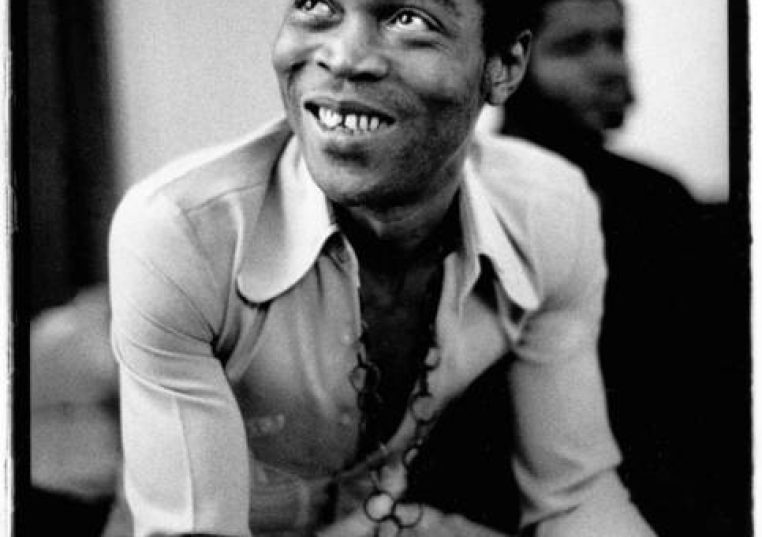Fela Aníkúlápó Kuti (born Olufela Olusegun Oludotun Ransome-Kuti; 15 October 1938[1] – 2 August 1997), also known as Abami Eda, was a Nigerian musician, bandleader, composer, political activist, and Pan-Africanist. He is regarded as the King of Afrobeat, a Nigerian music genre that combines West African music with American funk and jazz.[2] At the height of his popularity, he was referred to as one of Africa’s most “challenging and charismatic music performers”.[3] AllMusic described him as “a musical and sociopolitical voice” of international significance. Kuti was the son of Nigerian women’s rights activist Funmilayo Ransome-Kuti. After early experiences abroad, he and his band Africa 70 (featuring drummer and musical director Tony Allen) shot to stardom in Nigeria during the 1970s, during which he was an outspoken critic and target of Nigeria’s military juntas.[4] In 1970, he founded the Kalakuta Republic commune, which declared itself independent from military rule. The commune was destroyed in a 1978 raid that injured Kuti and his mother.[5] He was jailed by the government of Muhammadu Buhari in 1984, but released after 20 months. He continued to record and perform through the 1980s and 1990s. Since his death in 1997, reissues and compilations of his music have been overseen by his son, Femi Kuti. Olufela Olusegun Oludotun Ransome-Kuti[6] was born into the Ransome-Kuti family, an upper-middle-class Nigerian family, on 15 October 1938 in Abeokuta (the modern-day capital of Ogun State[7]), which at the time was a city in the British Colony of Nigeria.[8] His mother, Chief Funmilayo Ransome-Kuti, was an anti-colonial feminist, and his father, Reverend Israel Oludotun Ransome-Kuti, was an Anglican minister, school principal, and the first president of the Nigeria Union of Teachers.[9] Kuti’s parents both played active roles in the anti-colonial movement in Nigeria, most notably the Abeokuta Women’s Riots which was led by his mother in 1946.[10] His brothers Beko Ransome-Kuti and Olikoye Ransome-Kuti, both medical doctors, were well known nationally.[5] Kuti Is a cousin[11] to the writer and laureate Wole Soyinka, a Nobel Prize for Literature winner.[12] They are both descendants of Josiah Ransome-Kuti, who is Kuti’s paternal grandfather and Soyinka’s maternal great-grandfather. Kuti attended Abeokuta Grammar School. In 1958, he was sent to London to study medicine but decided to study music instead at the Trinity College of Music, with the trumpet being his preferred instrument.[5] While there, he formed the band Koola Lobitos and played a fusion of jazz and highlife.[14] In 1960, Kuti married his first wife, Remilekun (Remi) Taylor, with whom he had three children (Femi, Yeni, and Sola).[15] In 1963, Kuti moved back to the newly independent Federation of Nigeria, re-formed Koola Lobitos, and trained as a radio producer for the Nigerian Broadcasting Corporation. He played for some time with Victor Olaiya and his All-Stars. He called his style Afrobeat, a combination of Fuji music, funk, jazz, highlife, salsa, calypso, and traditional Yoruba music.[2] In 1969, Kuti took the band to the United States and spent ten months in Los Angeles. While there, he discovered the Black Power movement through Sandra Smith (now known as Sandra Izsadore or Sandra Akanke Isidore),[17] a partisan of the Black Panther Party. This experience heavily influenced his music and political views.[18] He renamed the band Nigeria 70. Soon after, the Immigration and Naturalization Service was tipped off by a promoter that Kuti and his band were in the US without work permits. The band performed a quick recording session in Los Angeles that would later be released as The ’69 Los Angeles Sessions. After Kuti and his band returned to Nigeria, the group was renamed (the) Africa ’70 as lyrical themes changed from love to social issues.[14] He formed the Kalakuta Republic—a commune, recording studio, and home for many people connected to the band—which he later declared independent from the Nigerian state. Kuti set up a nightclub in the Empire Hotel, first named the Afro-Spot and later the Afrika Shrine, where he both performed regularly and officiated at personalised Yoruba traditional ceremonies in honor of his nation’s ancestral faith. He also changed his name to Anikulapo (meaning “He who carries death in his pouch”, with the interpretation: “I will be the master of my own destiny and will decide when it is time for death to take me”).[5][20] He stopped using the hyphenated surname “Ransome” because he considered it a slave name. Kuti’s music was popular among the Nigerian public and Africans in general.[21] He decided to sing in Pidgin English so that individuals all over Africa could enjoy his music, where the local languages they speak are diverse and numerous. As popular as Kuti’s music had become in Nigeria and elsewhere, it was unpopular with the ruling government, and raids on the Kalakuta Republic were frequent. During 1972, Ginger Baker recorded Stratavarious, with Kuti appearing alongside vocalist and guitarist Bobby Tench.[22] Around this time, Kuti became even more involved with the Yoruba religion. In 1977, Kuti and Africa 70 released the album Zombie, which heavily criticized Nigerian soldiers, and used the zombie metaphor to describe the Nigerian military’s methods. The album was a massive success and infuriated the government, who raided the Kalakuta Republic with 1,000 soldiers. During the raid, Kuti was severely beaten, and his elderly mother (the first woman to drive a car in Nigeria) was fatally injured after being thrown from a window.[5] The commune was burnt down, and Kuti’s studio, instruments, and master tapes were destroyed. Kuti claimed that he would have been killed had it not been for a commanding officer’s intervention as he was being beaten. Kuti’s response to the attack was to deliver his mother’s coffin to the Dodan Barracks in Lagos, General Olusegun Obasanjo’s residence, and to write two songs, “Coffin for Head of State” and “Unknown Soldier,” referencing the official inquiry that claimed an unknown soldier had destroyed the commune. Kuti and his band took up residence in Crossroads Hotel after the Shrine had been destroyed along with the commune. In 1978, he married 27 women, many of whom were dancers, composers, and singers with whom he worked. The marriage served not only to mark the anniversary of the attack on the Kalakuta Republic but also to protect Kuti and his wives from authorities’ false claims that Kuti was kidnapping women.[24] Later, he adopted a rotation system of maintaining 12 simultaneous wives.[25] There were also two concerts in the year: the first was in Accra, in which rioting broke out during the song “Zombie”, which caused Kuti to be banned from entering Ghana; the second was after the Berlin Jazz Festival when most of Kuti’s musicians deserted him due to rumours that he planned to use all of the proceeds to fund his presidential campaign. In 1978, Fela performed at the Berliner Jazztage in Berlin with his band Africa 70. Disapointed by their fees, Tony Allen, the band leader and almost all the musicians resigned.[26] Since then, Baryton player Lekan Animashaun became band leader and Fela created a new group named Egypt80. In 1979, Kuti formed his political party, which he called Movement of the People (MOP), to “clean up society like a mop”,[5] but it quickly became inactive due to his confrontations with the government of the day. MOP preached Nkrumahism and Africanism.

